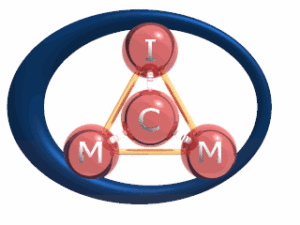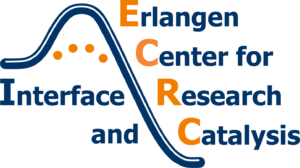A key mission from the very beginning was to develop FAU EAM as nucleus and driving force for future research in fundamental and applied aspects of advanced materials and processes. Within its new role, FAU EAM transformed and consolidated several existing FAU structures into FAU EAM units, and thus continuously develops fundamental research methods, provides high-class infrastructure, and translates research into application. Thus, FAU EAM is the nucleus for new research projects not only within ‘New Materials and Processes’, but also builds a strong foundation to foster collaboration projects with other FAU Key Research Priorities.
To fulfill its mission, FAU EAM is organized in seven units:
 Aim of the Interdisciplinary Center for Functional Particle Systems (FPS) is to develop innovative methods and processes to generate, formulate and apply particles (building blocks) with tailored size, shape and structure as well as customized surface properties. The efficient generation of advanced multifunctional products with high value can however only be realized by interdisciplinary approaches. Based on the cross-sectional topic of particles, FPS brings together chemical engineering, materials science, chemistry, physics and medicine.
Aim of the Interdisciplinary Center for Functional Particle Systems (FPS) is to develop innovative methods and processes to generate, formulate and apply particles (building blocks) with tailored size, shape and structure as well as customized surface properties. The efficient generation of advanced multifunctional products with high value can however only be realized by interdisciplinary approaches. Based on the cross-sectional topic of particles, FPS brings together chemical engineering, materials science, chemistry, physics and medicine.
fps.fau.de
 The Center for Nanoanalysis and Electron Microscopy (CENEM) is a facility featuring cutting-edge instrumentation, techniques and expertise required for microscopic and analytical characterization of materials and devices down to the atomic scale. CENEM focuses on several complementary analysis techniques, which closely work together: Electron Microscopy, X-ray Microscopy, Cryo-TEM, Scattering Methods, Scanning Probes and Atom Probe Microscopy.
The Center for Nanoanalysis and Electron Microscopy (CENEM) is a facility featuring cutting-edge instrumentation, techniques and expertise required for microscopic and analytical characterization of materials and devices down to the atomic scale. CENEM focuses on several complementary analysis techniques, which closely work together: Electron Microscopy, X-ray Microscopy, Cryo-TEM, Scattering Methods, Scanning Probes and Atom Probe Microscopy.
cenem.fau.de
 The Center for Computational Advanced Materials and Processes (CAMP) is the direct link to the FAU Competence Center for Scientific Computing (CSC) and aims to maintain its strong capabilities in Modeling and Simulation and apply these to new research fields, in particular in the area of advanced materials and processes. The participating scientists have a strong expertise in all fields of scientific computing including Modeling, Algorithms & Software, High Performance Computing and Data Science.
The Center for Computational Advanced Materials and Processes (CAMP) is the direct link to the FAU Competence Center for Scientific Computing (CSC) and aims to maintain its strong capabilities in Modeling and Simulation and apply these to new research fields, in particular in the area of advanced materials and processes. The participating scientists have a strong expertise in all fields of scientific computing including Modeling, Algorithms & Software, High Performance Computing and Data Science.
csc.fau.eu
 The ICMM is a platform for interdisciplinary research projects in the fields of Molecular Materials and Nanotechnology. The participating scientists possess very strong research expertise in molecular electronics, functional carbon-rich molecular architectures, 2D materials, light-energy conversion, electron transfer in molecular and supramolecular materials, molecular magnetism, molecules on surfaces, inorganic nanostructures and biomimetic materials.
The ICMM is a platform for interdisciplinary research projects in the fields of Molecular Materials and Nanotechnology. The participating scientists possess very strong research expertise in molecular electronics, functional carbon-rich molecular architectures, 2D materials, light-energy conversion, electron transfer in molecular and supramolecular materials, molecular magnetism, molecules on surfaces, inorganic nanostructures and biomimetic materials.
chemistry.nat.fau.eu/icmm/
 Researchers at the IZNF are engaged in both basic research and technically relevant applications associated with materials interface sciences. They are developing new methods to deposit films with up to atomic precision and to structure them in the nanometer range, they are investigating their internal composition and researching their chemical, physical and mechanical properties.
Researchers at the IZNF are engaged in both basic research and technically relevant applications associated with materials interface sciences. They are developing new methods to deposit films with up to atomic precision and to structure them in the nanometer range, they are investigating their internal composition and researching their chemical, physical and mechanical properties.
iznf.fau.de
 The Erlangen Center for Interface Research and Catalysis (ECRC) is an interdisciplinary center, which brings together research groups from the Departments Chemistry and Pharmacy, Chemical and Bioengineering, Physics, and Materials Science. The ECRC aims to strengthen research on catalysis and interfaces in all its facets from basic research to process development.
The Erlangen Center for Interface Research and Catalysis (ECRC) is an interdisciplinary center, which brings together research groups from the Departments Chemistry and Pharmacy, Chemical and Bioengineering, Physics, and Materials Science. The ECRC aims to strengthen research on catalysis and interfaces in all its facets from basic research to process development.
ecrc.fau.eu/
 The research of the ZMP is focused on interdisciplinary topics being located in-between Material Sciences, Mechanical Engineering, Chemistry and Physics. In a young and highly innovative environment, new material concepts and the corresponding production techniques concerning lightweight constructional components are developed. The advancement of ideas being formed in fundamental research to the state of prototyping forms the basic goal.
The research of the ZMP is focused on interdisciplinary topics being located in-between Material Sciences, Mechanical Engineering, Chemistry and Physics. In a young and highly innovative environment, new material concepts and the corresponding production techniques concerning lightweight constructional components are developed. The advancement of ideas being formed in fundamental research to the state of prototyping forms the basic goal.
zmp.fau.de/

 Aim of the Interdisciplinary Center for Functional Particle Systems (FPS) is to develop innovative methods and processes to generate, formulate and apply particles (building blocks) with tailored size, shape and structure as well as customized surface properties. The efficient generation of advanced multifunctional products with high value can however only be realized by interdisciplinary approaches. Based on the cross-sectional topic of particles, FPS brings together chemical engineering, materials science, chemistry, physics and medicine.
Aim of the Interdisciplinary Center for Functional Particle Systems (FPS) is to develop innovative methods and processes to generate, formulate and apply particles (building blocks) with tailored size, shape and structure as well as customized surface properties. The efficient generation of advanced multifunctional products with high value can however only be realized by interdisciplinary approaches. Based on the cross-sectional topic of particles, FPS brings together chemical engineering, materials science, chemistry, physics and medicine. The Center for Nanoanalysis and Electron Microscopy (CENEM) is a facility featuring cutting-edge instrumentation, techniques and expertise required for microscopic and analytical characterization of materials and devices down to the atomic scale. CENEM focuses on several complementary analysis techniques, which closely work together: Electron Microscopy, X-ray Microscopy, Cryo-TEM, Scattering Methods, Scanning Probes and Atom Probe Microscopy.
The Center for Nanoanalysis and Electron Microscopy (CENEM) is a facility featuring cutting-edge instrumentation, techniques and expertise required for microscopic and analytical characterization of materials and devices down to the atomic scale. CENEM focuses on several complementary analysis techniques, which closely work together: Electron Microscopy, X-ray Microscopy, Cryo-TEM, Scattering Methods, Scanning Probes and Atom Probe Microscopy. The Center for Computational Advanced Materials and Processes (CAMP) is the direct link to the FAU Competence Center for Scientific Computing (CSC) and aims to maintain its strong capabilities in Modeling and Simulation and apply these to new research fields, in particular in the area of advanced materials and processes. The participating scientists have a strong expertise in all fields of scientific computing including Modeling, Algorithms & Software, High Performance Computing and Data Science.
The Center for Computational Advanced Materials and Processes (CAMP) is the direct link to the FAU Competence Center for Scientific Computing (CSC) and aims to maintain its strong capabilities in Modeling and Simulation and apply these to new research fields, in particular in the area of advanced materials and processes. The participating scientists have a strong expertise in all fields of scientific computing including Modeling, Algorithms & Software, High Performance Computing and Data Science. The ICMM is a platform for interdisciplinary research projects in the fields of Molecular Materials and Nanotechnology. The participating scientists possess very strong research expertise in molecular electronics, functional carbon-rich molecular architectures, 2D materials, light-energy conversion, electron transfer in molecular and supramolecular materials, molecular magnetism, molecules on surfaces, inorganic nanostructures and biomimetic materials.
The ICMM is a platform for interdisciplinary research projects in the fields of Molecular Materials and Nanotechnology. The participating scientists possess very strong research expertise in molecular electronics, functional carbon-rich molecular architectures, 2D materials, light-energy conversion, electron transfer in molecular and supramolecular materials, molecular magnetism, molecules on surfaces, inorganic nanostructures and biomimetic materials. Researchers at the IZNF are engaged in both basic research and technically relevant applications associated with materials interface sciences. They are developing new methods to deposit films with up to atomic precision and to structure them in the nanometer range, they are investigating their internal composition and researching their chemical, physical and mechanical properties.
Researchers at the IZNF are engaged in both basic research and technically relevant applications associated with materials interface sciences. They are developing new methods to deposit films with up to atomic precision and to structure them in the nanometer range, they are investigating their internal composition and researching their chemical, physical and mechanical properties. The Erlangen Center for Interface Research and Catalysis (ECRC) is an interdisciplinary center, which brings together research groups from the Departments Chemistry and Pharmacy, Chemical and Bioengineering, Physics, and Materials Science. The ECRC aims to strengthen research on catalysis and interfaces in all its facets from basic research to process development.
The Erlangen Center for Interface Research and Catalysis (ECRC) is an interdisciplinary center, which brings together research groups from the Departments Chemistry and Pharmacy, Chemical and Bioengineering, Physics, and Materials Science. The ECRC aims to strengthen research on catalysis and interfaces in all its facets from basic research to process development. The research of the ZMP is focused on interdisciplinary topics being located in-between Material Sciences, Mechanical Engineering, Chemistry and Physics. In a young and highly innovative environment, new material concepts and the corresponding production techniques concerning lightweight constructional components are developed. The advancement of ideas being formed in fundamental research to the state of prototyping forms the basic goal.
The research of the ZMP is focused on interdisciplinary topics being located in-between Material Sciences, Mechanical Engineering, Chemistry and Physics. In a young and highly innovative environment, new material concepts and the corresponding production techniques concerning lightweight constructional components are developed. The advancement of ideas being formed in fundamental research to the state of prototyping forms the basic goal.